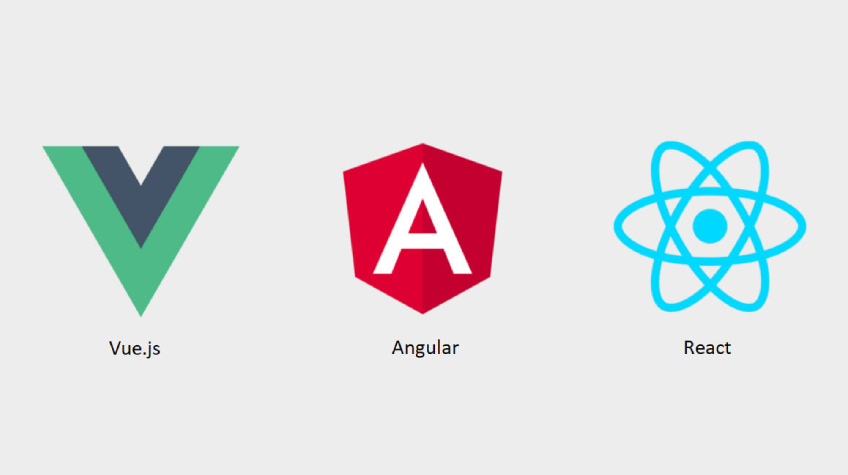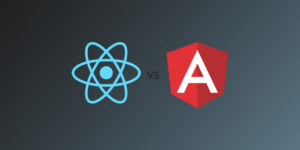
A business can lay a strong foundation if it chooses the best technology for its web development. However, it is not that simple. If you look around, you will see many different technologies available, and most of them are pretty good. If you narrow down your search result, the top three will be ReactJS, VueJS, and AngularJS. While both React and Angular have been around for quite a while, the new entrant to the game is Vue.
All three come with some excellent features and businesses need to choose the right platform for their website development. If you are a developer trying a new project on a JavaScript framework, this guide would help you decide which framework to go with. In this article, we will discuss the three frameworks, so you can pick the best one for your business.
History of the above three mentioned frameworks:
- Angular – Angular is a framework developed by Google, and since Google is using Angular internally, one can be sure it will not disappear anytime soon. Moreover, it will be continuously maintained and improved. Angular 11, the latest version of Angular, was released in November 2020.
- React – React is a library developed by Facebook, and Facebook uses it internally. Hence, even React is here to stay. React was initially released in 2013 and its latest version 17. X was released in October 2020.
- Vue – Vue is a standalone project not built inside any company. It was released in 2014. It is the idea and creation of one man – Evan You. At present, there is a dedicated team of core developers that work on Vue. The current latest version, 3.0 was released in September 2020.
Vue vs Angular vs React: How to pick the best one?
Before we talk about the three frameworks (or libraries), you must understand the one thing – there is no best library or framework. They all are popular and have their own strengths and weaknesses. The first thing you need to do before using an open-source framework is to go through its license. All of these frameworks use the MIT license.
The only thing you should know related to this is – this license provides limited restrictions on reuse, even in proprietary software. Before using any framework or software, you should know the implications of using it. In general, you can use any of three libraries for any of the projects.
After knowing all three frameworks, you must choose the one that you like. To work successfully with the technology as a developer or a business owner, you need to like the technology, right?
Comparison: Let us look at the three with respect to different parameters and see how one is different from the other.
► Philosophies
- Angular – There is no question that Angular is the biggest framework of the three and is also referred to as a platform. It helps developers control the UI, validate user input in forms, routing, state management sending Ajax HTTP requests, reacting to user input, building applications, and much more.
- It also comes with an official CLI that helps you to create and manage Angular projects up to date. To sum up, Angular is about building re-usable interface components that you can control and combine with other components.
- React – It is totally different from Angular. As we have seen above, Angular gives you a lot of things. React comes with one thing – you get a library for rendering content to the DOM and controlling it efficiently thereafter. It offers you tools that you need to define what should be rendered and under which circumstances. There are no supports for built-in form validation nor does it include a router.
- Vue – It is a framework, somewhere between the other two. It is not as big as Angular but has more features than React. It comes with built-in state management and also with a built-in router. Even Vue does not include HTTP client and form validation functionalities.
► Migration
Since you will be working with the framework of your choice, you do not have to worry about frequent framework updates and updates messing up your code. It does not matter which framework you are working on, you won’t have any issues from one version to another. However, you should be careful when some significant updates come.
- If you plan to use Angular, it sends major updates every six months. You also get additional six months before any major APIs are deprecated. In short, you get a time of two release cycles or one year to make the necessary changes on your website.
- React is a child of Facebook, and the company has always mentioned that stability is of prime importance for them. Upgrades through versions are easiest in React. You can hire ReactJS developers who can use scripts like react-codemod for migration.
- Vue has mentioned in its migration document that the version 2 and 3 is mostly the same and 90% of the API is the same if you migrate from version 1 to 2. You will find a migration helper tool for Vue migration which makes migration easy.
► Syntax
Now let us get a bit technical to understand the difference between the three. As mentioned at the start, you should like the way coding is done.
- TypeScript, a superset to Javascript, is used in Angular projects.. TypeScript does not run in the browser. However, Angular projects include tools that will compile the TypeScript code down to browser compatible Javascript code.
- React in most cases uses JavaScript. It uses a special Javascript feature known as JSX which is not part of the Javascript language. As Angular has TypeScript, JSX is compiled to regular, browser-friendly Javascript code behind the scenes.
- Vue uses regular JavaScript and utilizes something called Single File Components. Just like Angular, it splits Javascript logic and template (HTML) apart.
Which syntax is best? It must be easy for you to answer – but there is no best syntax. Different developers prefer different frameworks. Some developers love JSX, some simple Javascript, and some prefer Angular’s structured code.
Ease of Learning
Angular features a steep learning curve because it requires you to learn associated concepts like MVC and TypeScript. Even though it is a bit hard to learn Angular, the returns are good once you understand it. React is easier to get started since the documentation is thorough and complete and has all the common problems developers face. With React, you will also need to learn advanced features, so even though learning is not too difficult, it largely depends on what additional functionalities you plan to learn. Of the three, Vue is the easiest to learn. There are two reasons for it:
- There is no special setup required and you can start by importing the Vue library into an HTML file and adding some JS to that file.
- It uses JavaScript and HTML, and hence there is no special syntax you need to learn to start using it.
Load times and Size
It is not a very big factor in choosing one of three as caching and minification are pretty standard nowadays. There is definitely a significant difference between the sizes of the framework but they are small compared to the average webpage size. All three frameworks deliver great runtime performance and are used in production on big websites with complex user interfaces and with a lot of traffic.
Conclusion
There is no clear winner in Vue vs Angular vs React framework. Based on your requirement, one of these is definitely going to be better than the others. We hope this article provided you with insights on what to look for when working on the website for your business.






